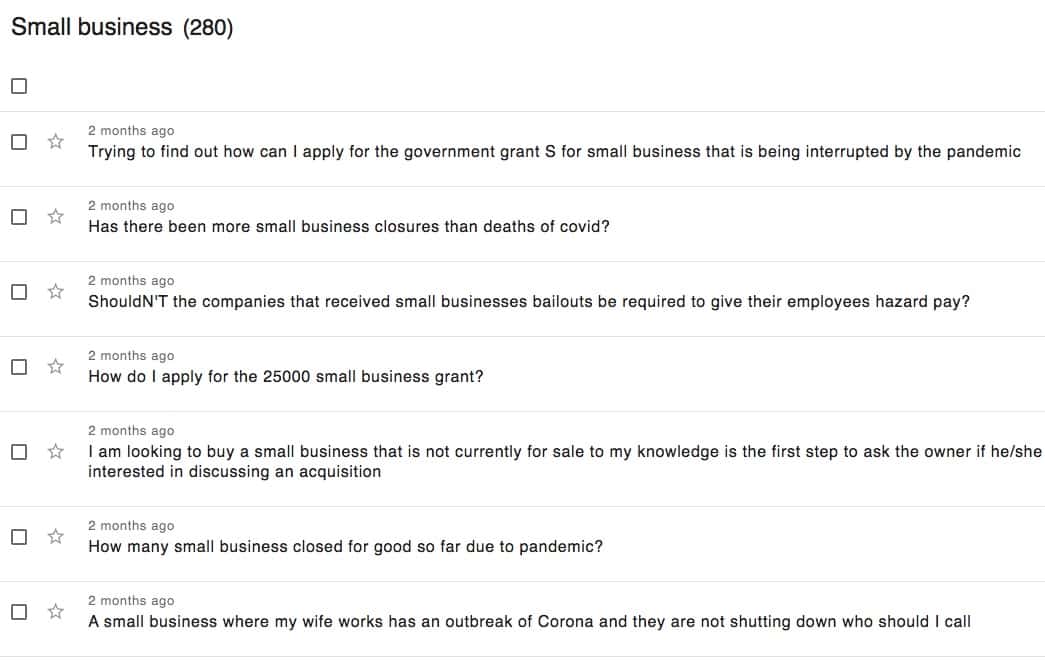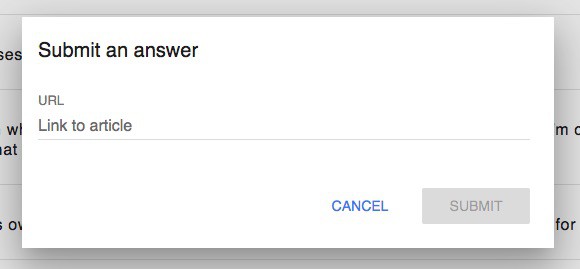Using Google Question Hub for Content Marketing
15 percent of queries that Google sees each day are new and haven’t been seen before.
Since Google sees billions of searches every day, this means that at least 150 million daily searches produce results that may not satisfy search intent.
Searcher curiosity outpaces content, which creates a backlog of non-existent digital media. That’s why Google Question Hub was created – for publishers to help better satisfy search intent.
In this post, we’ll dive into how to use Google Question Hub for content marketing.
What Is Google Question Hub?
Question Hub is a tool that enables creators to create content by leveraging unanswered questions.
First, Google collects unanswered questions directly from users to identify content gaps online.
Then, unanswered questions are made available to content creators via Google Search Console. Publishers can use these insights to create better content for their audience.
Finally, once content has been created, publishers can submit their content to Google for consideration to appear in search results to satisfy search intent.
By making unanswered questions available, Google Question Hub exists to improve the web for everyone.
Searchers get answers to their questions. Publishers get more traffic. Google reduces the backlog of non-existent digital media.
It’s a win-win-win for everyone.
How to use Google Question Hub for Content Marketing

Google Question Hub has multiple uses for content marketing.
- Keyword Research
- Blog Topics
- Article Outlines
- Content Refresh
- Content Promotion
Let’s dive into these areas in more detail.
Keyword Research with Google Question Hub
How can a content marketer use Google Question Hub for keyword research?
Publishers who target long-tail keywords to gain visibility online will find Google Question Hub to be a wonderful keyword research tool. The issue with keyword research tools is that sometimes there’s not enough data or search volume to present long-tail keywords as valuable content targets.
But with Google Question Hub, content marketers can identify valuable long-tail keywords by evaluating questions that are “Asked Multiple Times.” For example, a good “recycling” keyword may be “recycle center in Colusa” or “how to obtain a small blue recycle bin.”
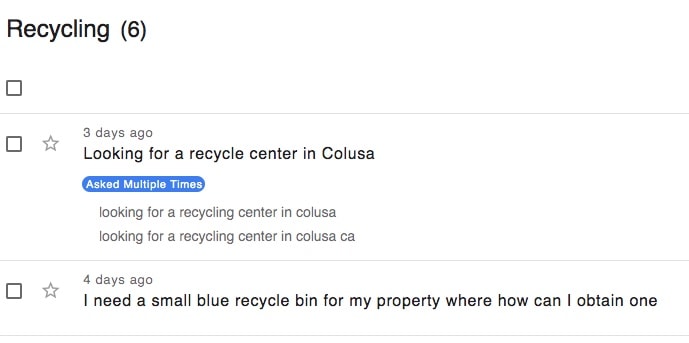
While Google Question Hub may still have a ways to go before being a top keyword search tool, it may carve out a place when formulating a content strategy.
Blog Topics with Question Hub
Google Question Hub provides content marketers with millions of blog topic ideas.
Just enter a search term or select a topic via Question Hub, and you’ll receive questions that can be used as blog topics.
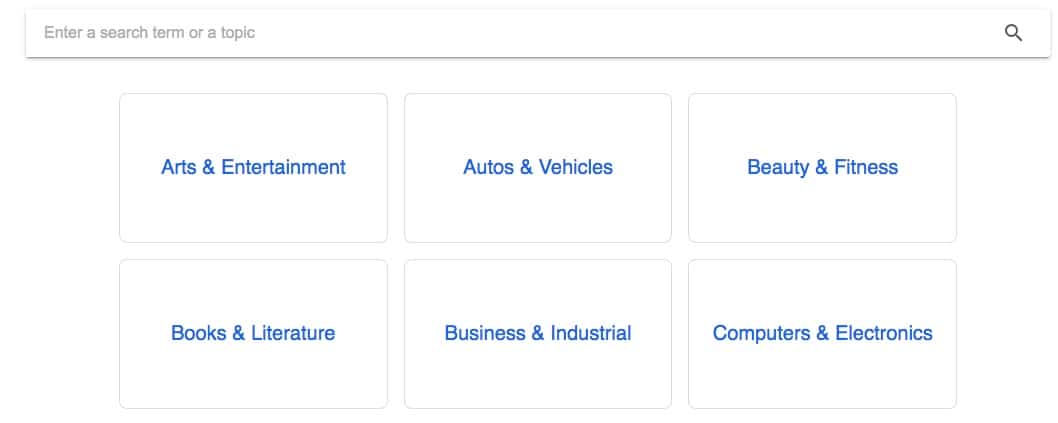
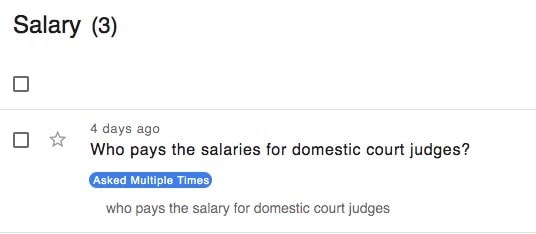

Using the examples above, a publisher could use these questions as starting points for blog topics.
Article Outlines with Question Hub
Google Question Hub can enrich an article outline by adding more depth to the content.
By incorporating unanswered questions into an outline, a publisher can better satisfy search intent around a given topic. For example, if an article outline were created for a career in water management, the outline may want to include helpful “skills and traits” as suggested by this opportunity in Google Question Hub:
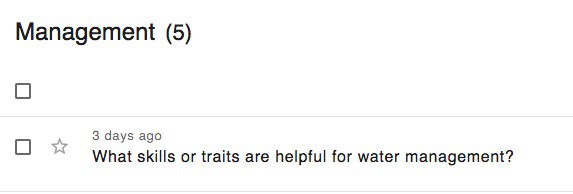
By using Google Question Hub for article outlines, content marketers can create content that is well-researched and satisfies search intent.
Content Refresh with Google Question Hub
Content marketing isn’t just about creating new content. Sometimes, updating existing content can help a site stay relevant and ahead of competitors.
Google Question Hub provides content marketers with several content refresh opportunities. Just search Question Hub by keyword or topic, and see what the latest questions are from searchers.
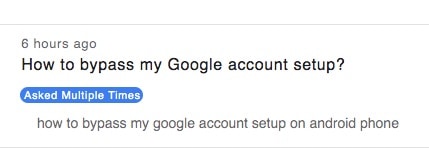
Using the example above, a content marketer may want to consider answering this question in a refresh of an existing article related to “Google accounts.”
Content Promotion With Google Question Hub
An effective content marketing strategy outlines a promotion plan after publishing. Google Question Hub now adds one more checklist item on a content promotion plan.
For example, a publisher may type in their topic and search for questions that may match existing content on their website. As an SEO company, we discovered the question below and submitted our plumbing SEO page for consideration.
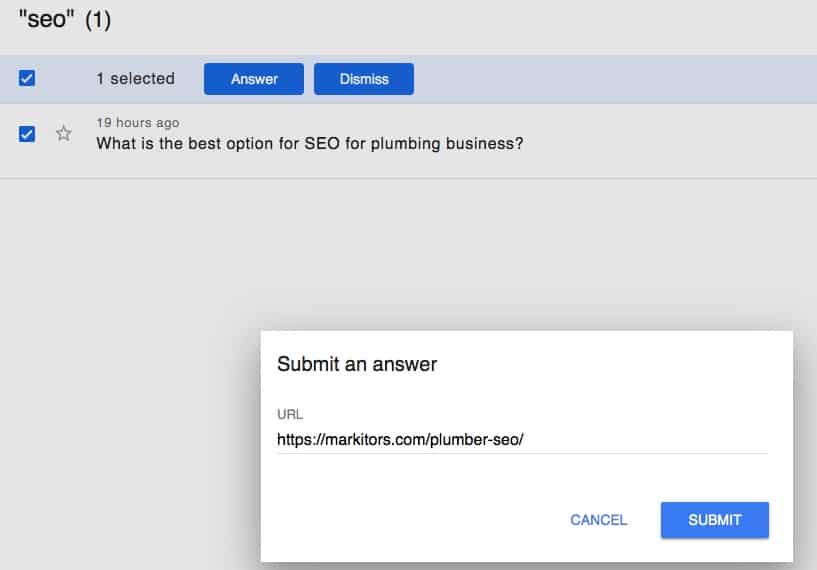
Frequently reviewing and revisiting Google Question Hub may add an additional action a publisher can take to promote their content.
Getting Started With Google Question Hub
Google Question Hub has several uses for content marketing. Identify questions, create content, and then submit a URL to begin attracting traffic.
Here’s how to get started with Google Question Hub.
- Sign Up
- Select Topics
- Select Questions
- Create Content
- Submit URL
Step 1: Sign Up
Sign up for Google Question Hub by first connecting your Google Search Console account. Then, select verified Search Console sites where you would like to use Question Hub. As a final step, pick your language and country preferences before clicking “Get Started.”
Step 2: Select Topics
Once you are signed up, you can begin adding questions to your Question Hub. You can enter a search term or topic in the search box, or click one of the preselected topic areas.
If selecting from an existing topic, there are hundreds of subtopics to choose from.
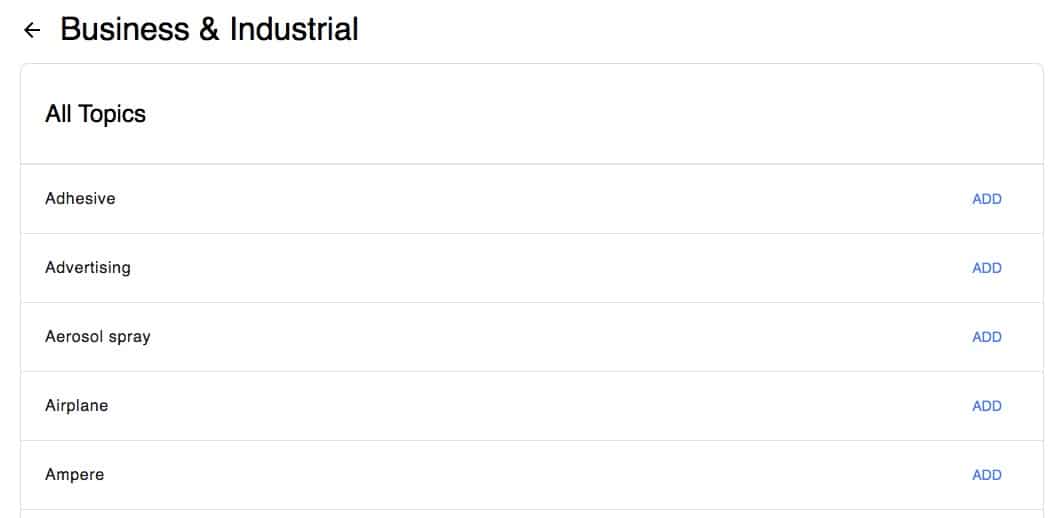
Click “Add” to begin adding questions from your topic into Question Hub. Keep clicking “Add” to populate Question Hub with ten questions at a time from a topic. Some topics have more questions than others, and you may hit a capacity limit if there’s no more questions in a selected topic.
Step 3: Select Questions
Now that the topic is populated with queries Google has collected from users, it’s time to select questions.
At this point in Question Hub’s Beta phase, selecting questions requires lots of manual filtering to select relevant questions. There are certain features that may help selecting questions become easier for publishers, such as the “Asked Multiple Times” tab or the “Starred” feature.

But for now, publishers can read through user generated questions and use their editorial judgement on where to focus their publishing efforts.
Here is an example of questions from Question Hub’s Small Business topic:
Step 4: Create & Publish Content
Once a question has been selected, it’s time to include the question in the creation and publishing of content.
Some publishers may choose to refresh their content by incorporating a question into an existing article. Others may choose to create a new piece of content that focuses on answering the question.
For new content creation, publishers may consider posting their question to a knowledge platform like Terkel or a Q&A site like HARO to expedite the content creation process. Publishers receive a full article that’s ready to be published using Terkel, where publishers ask a question and receive ten expert insights with a pre-written introduction. Alternatively, HARO can provide insights from individuals if a publisher needs a quote from a source.
Regardless of whether content is created using an external tool like Terkel or in-house, the content should be published to a Search Console verified site before submission.
Step 5: Submit an Answer To Question Hub
The final step is to submit an answer to Question Hub with a link to your article. The URL of the submitted answer will then be considered to be included in search results and may be shared with the user who submitted the original question.
Next Steps
Google Question Hub is a content marketing tool that enables publishers to create deep, comprehensive content to satisfy search intent.
As a final next step, try out the tool and track your impact. See if your content connects with your target audience, and use tools like Google Analytics, Search Console, and Question Hub to track its reach.
Have questions about Question Hub? Contact us. We’re paying close attention to the advancements with this new tool for content marketers.



